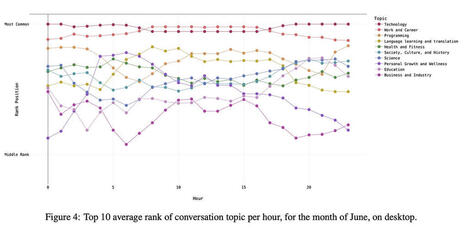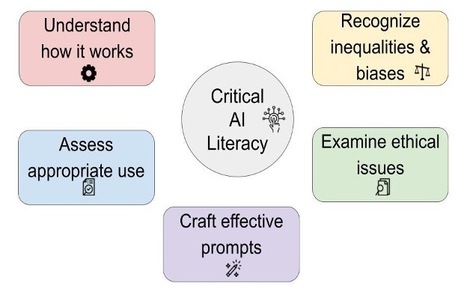 Your new post is loading...
 Your new post is loading...

|
Scooped by
Ana Cristina Pratas
February 17, 2016 6:40 AM
|
Voices in the Feminine - Female Voices Around the Web

|
Scooped by
Ana Cristina Pratas
December 21, 5:48 AM
|
What 37.5 million AI chats show us about how learners use AI at the end of 2025 — and what this means for how we design & deliver learning experiences in 2026

|
Scooped by
Ana Cristina Pratas
December 19, 9:25 AM
|
Originally Published: Aug 15, 2025

|
Scooped by
Ana Cristina Pratas
December 14, 12:56 PM
|
How do we live whole in a breaking world? It helps to bless what is simply for being. It helps to thank everything for its unbidden everythingness. And still we need help — help holding on to…

|
Scooped by
Ana Cristina Pratas
December 8, 6:28 AM
|
The son of a Wisconsin schoolteacher, Todd Bol was well into his fifties when he dreamt up the first Little Free Library, not expecting that tens of thousands of these tiny shrines to the love of r…

|
Scooped by
Ana Cristina Pratas
December 4, 8:17 AM
|
The best way to help learners form accurate concepts is to provide examples and nonexamples. Here are 6 ways to do that.

|
Scooped by
Ana Cristina Pratas
November 26, 4:38 AM
|
Abstract
This study explores how discussing metaphors for AI can help build awareness of the frames that shape our understanding of AI systems, particularly large language models (LLMs) like ChatGPT. Given the pressing need to teach “critical AI literacy”, discussion of metaphor provides an opportunity for inquiry and dialogue with space for nuance, playfulness, and critique. Using a collaborative autoethnographic methodology, we analyzed metaphors from a range of sources, and reflected on them individually according to seven questions, then met and discussed our interpretations. We then analyzed how our reflections contributed to the three kinds of literacies delineated in Selber’s multiliteracies framework: functional, critical and rhetorical. These allowed us to analyze questions of ethics, equity, and accessibility in relation to AI. We explored each metaphor along the dimension of whether or not it was promoting anthropomorphizing, and to what extent such metaphors imply that AI is sentient. Our findings highlight the role of metaphor reflection in fostering a nuanced understanding of AI, suggesting that our collaborative autoethnographic approach as well as the heuristic model of plotting AI metaphors on dimensions of anthropomorphism and multiliteracies, might be useful for educators and researchers in the pursuit of advancing critical AI literacy.

|
Scooped by
Ana Cristina Pratas
November 23, 1:19 PM
|
Here we are, living these lives bright and perishable as a poppy, hard and shimmering as obsidian. We know that they are entirely improbable, that we bless that bright improbability with each flash…

|
Scooped by
Ana Cristina Pratas
November 18, 11:36 AM
|
Tools and resources to navigate our grief journeys. . .

|
Scooped by
Ana Cristina Pratas
November 9, 6:53 AM
|
When I was a child, little delighted me more than the magical green garlands draping from the pine trees, which I made into wreaths and mustaches to roam the mountains of Bulgaria as a miniature Or…

|
Scooped by
Ana Cristina Pratas
November 5, 10:23 AM
|
How to infuse persuasive messages into learning experiences when you need to convince the target audience to change behaviors or attitudes. The Peripheral Route to Persuasion
On the other hand, the peripheral route to persuasion is based more on non-cognitive factors that surround the message. This could be based on:
the emotional impact of the communication
the credibility and characteristics of the sender
the visual design
the length of the message

|
Scooped by
Ana Cristina Pratas
October 23, 7:19 AM
|
Aka, a 5-step process to maximise AI's value while actively managing its risks

|
Scooped by
Ana Cristina Pratas
October 17, 7:57 AM
|
Based on work with undergraduates on the assignment The Research Paper
|

|
Scooped by
Ana Cristina Pratas
December 23, 5:24 AM
|
And why co-writing policies is more powerful than surveillance

|
Scooped by
Ana Cristina Pratas
December 21, 5:46 AM
|
Insights on students' perspectives with AI policy and writing with AI

|
Scooped by
Ana Cristina Pratas
December 17, 4:25 AM
|
Aka, how to build AI content that engages learners & enhances learning

|
Scooped by
Ana Cristina Pratas
December 13, 12:42 PM
|
Because I read for the same reason I write — to fathom my life and deepen my living — looking back on a year of life has always been looking back on a year of reading. Here are the book…

|
Scooped by
Ana Cristina Pratas
December 6, 6:45 AM
|
Understanding AI Through the Student Lens

|
Scooped by
Ana Cristina Pratas
November 26, 4:45 AM
|
Batting away the hype, bias, and botshit, LSE HE Blog Fellow, Maha Bali, champions the need for cultivating critical AI literacy in our students, and shares tried and tested teaching ideas and exercises for educators I’ve been teaching a course on digital literacies and intercultural learning for...

|
Scooped by
Ana Cristina Pratas
November 24, 3:45 AM
|
By Shannon Donnally Quinn, Michigan State University DOI: https://www.doi.org/10.69732/TTMG9189 This short article is part of our new series, “5 Takeaways”, where authors share their reactions to a book or other media by highlighting five key points – big or small

|
Scooped by
Ana Cristina Pratas
November 22, 2:46 AM
|
Your brain's middle finger to people-pleasing

|
Scooped by
Ana Cristina Pratas
November 13, 12:16 PM
|
These remarks were delivered this evening at the Creatively Critical Tech Speaker Series at Illinois State University.
"There is no good way to say this."
These are the opening words of Yiyun Li’s latest book Things in Nature Only Grow about life after the death by suicide of both (...) We grieve because we love. We grieve because we care. We grieve because we know that the machines do not, and that the community we try to foster -- on campus, in the classroom, in our scholarly works -- is threatened with erasure. We grieve because we fear forgetting; we worry that people will forget what is beautiful and what is difficult and what is joyous and what is horrible about education. We worry that, if we do not grieve, we give up the struggle to go on, to persevere, to live. But we do not, we should not grieve alone. We should not be made to feel alone, feel crazed by our grief, feel crazed for grieving. We can, we should grieve together, grieve in public, grieve in protest. Such is comfort – "com" + "fort," a word that means "with" + "strength."

|
Scooped by
Ana Cristina Pratas
November 7, 11:54 AM
|
Today's bird is the Adélie penguin; the subject of today's email, the condiment – both attempts to reference Pittsburgh PA, where I'm in town to speak at a technology and ethics conference at Duquesne University.
I am still very much in recovery mode from Sunday's big event. Nothing on my body

|
Scooped by
Ana Cristina Pratas
October 24, 8:08 AM
|
"AI slop is winning," writes The Atlantic's Charlie Warzel.
By volume alone, slop may be the most visible and successful by-product of the generative-AI era to date. It is also a hallmark of what I’ve previously described as a collective delusion around artificial intelligence—where the breathless hype and

|
Scooped by
Ana Cristina Pratas
October 17, 8:09 AM
|
Learn why cameras matter in online classrooms. Explore strategies to increase student presence, engagement, and connection while supporting meaningful virtual learning and teaching best practices.

|
Scooped by
Ana Cristina Pratas
October 8, 7:20 AM
|
A new L&D operating system for the AI Era?
|


 Your new post is loading...
Your new post is loading...
 Your new post is loading...
Your new post is loading...


































Virginia Woolf summed it up beautifully:
“A woman must have money and a room of her own if she is to write fiction.”
Today I would say that to write, a woman must have a space of her own and wifi.
This curation is about education, eLearning, Instructional Design, Marketing, Love, Social Change. Life in general.
Views, values, perspectives written by women who are no longer shackled by obedient silence but play an important contribution to web culture.